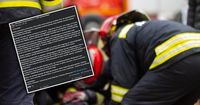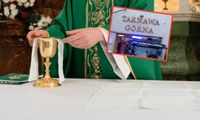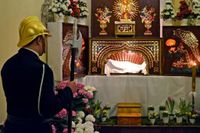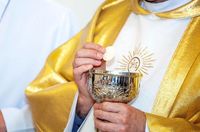In a controversial incident during the Easter Resurrection Mass in Tarnawa Górna, Poland, firefighters from the local volunteer fire departments were denied Holy Communion by a priest due to their decision to approach the sacrament while standing. This refusal has sparked outrage among the community and raised questions about the practices within the church.
The event took place on April 21, 2025, when firefighters from OSP Tarnawa Górna and OSP Tarnawa Dolna attended the service in uniform. Adhering to the regulations of their uniformed services, they chose to stand while receiving communion, a decision that was met with immediate disapproval from the priest officiating the mass. The priest reportedly claimed that "standing is a lack of respect towards God" and asserted that "it is not God's law, but human law." This statement left the firefighters feeling disheartened and concerned about the implications of their actions.
Following the incident, the firefighters released an official statement via social media, expressing their sadness over the priest's remarks. They emphasized their commitment to the values of "God, Honor, and Fatherland" and highlighted that their posture was in line with both liturgical regulations and the customs of uniformed services. They pointed out that, according to the Catholic Church's guidelines in Poland, both kneeling and standing are acceptable postures for receiving communion, as long as they are accompanied by a gesture of respect.
In their statement, the firefighters referenced the Church instruction "Redemptionis Sacramentum" (point 91), which clearly states that communion should not be denied to any faithful who approach it in accordance with liturgical regulations. They expressed their dedication to serving the community and their deep reverence for God, insisting that their choice to stand was not an act of disrespect but rather a reflection of their commitment to service.
The incident quickly gained traction on social media, with numerous comments from parishioners and internet users expressing outrage at the priest's behavior. Many voiced their support for the firefighters, urging others to report the priest to higher church authorities. One commenter suggested it was time to put an end to what they termed the "private farm" of the priest, reflecting a growing sentiment that the priest's actions were inappropriate and out of touch with the community's values.
"How could anyone deny communion to someone during Easter?" questioned one user, while another remarked on the need for the church to address such issues more seriously. Many commenters recalled a time when the parish had functioned more harmoniously under previous leadership, indicating a shift in the atmosphere of the church community.
The situation has drawn attention beyond the local parish. Fr. Bartosz Rajnowski, the spokesman for the Przemyśl Archdiocese, commented on the matter, stating that members of uniformed services, like the firefighters, should be allowed to receive communion standing as a sign of respect for their uniforms. He added that there are more significant reasons that could justify a refusal of communion, such as being in a state of serious sin or publicly opposing church teachings, but the firefighters did not fall into these categories.
The priest's refusal to grant communion based on their standing posture has raised broader questions about the interpretation of church rules and the expectations placed on parishioners during sacred ceremonies. The firefighters' experience highlights a potential disconnect between the church's guidelines and the practices of some clergy members.
In the aftermath of the incident, many community members have rallied behind the firefighters, emphasizing their ongoing support for the church and its activities. The firefighters have consistently participated in church events, including vigil duties at the tomb of Christ during Holy Week, demonstrating their commitment to their faith and community.
The controversy has served as a reminder of the importance of inclusivity and respect within religious practices. As the church continues to navigate these challenges, it remains to be seen how leaders will address the concerns raised by both the firefighters and the community at large.
In conclusion, the refusal of communion to firefighters during a significant religious ceremony has ignited a dialogue about respect, tradition, and the role of clergy in the lives of parishioners. As the story unfolds, it will be crucial for church authorities to listen to the voices of their community and ensure that such incidents do not undermine the spirit of unity and service that lies at the heart of their faith.




